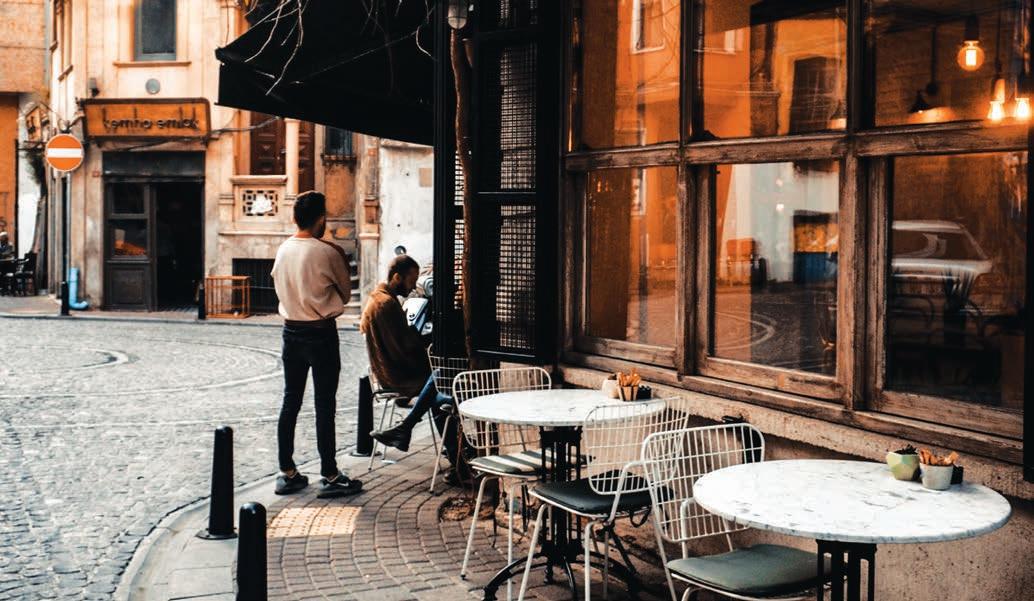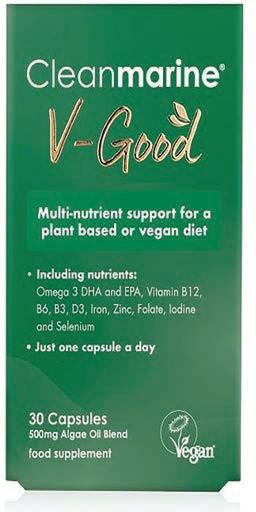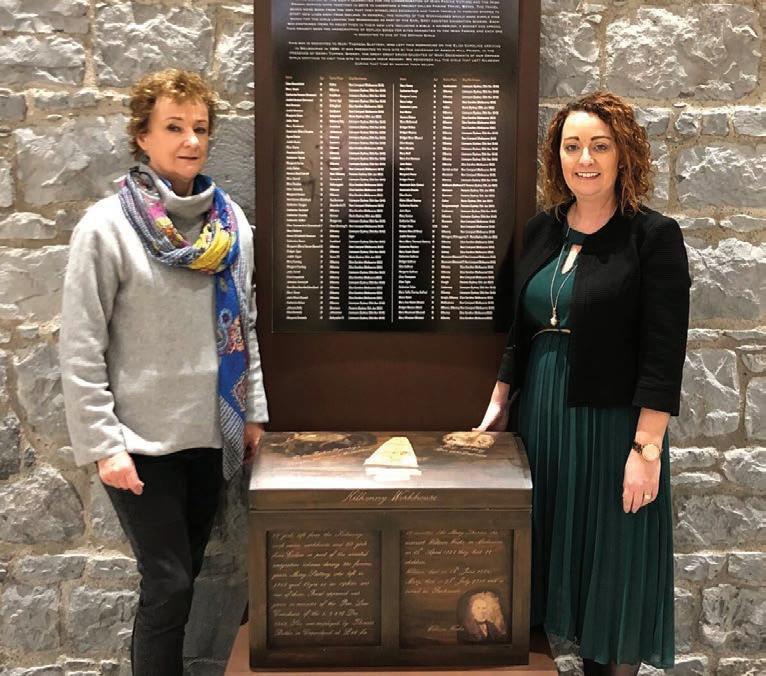
10 minute read
Marianne Heron
Why we need a piazza culture here
AS I SEE IT
Advertisement
MARIANNE HERON
is is the time of year, festivities over when holiday brochures normally grab our attention. ose technicolour pictures hold the promise of golden sunshine, azure sea and a cultural shot-in-the-arm o ered by somewhere abroad. Not yet though, given the rampant Omicron.
Sometimes there were things you enjoyed on previous breaks that you tried bringing back with you. But did you ever notice how some things just don’t translate back home? Take a bottle of ouzo for instance, a cloudy, aromatic glass of the stu just won’t taste the same as it did on some Greek island. No chance. ere are plenty of experiences enjoyed abroad that we have successfully adopted, from tapas to barbeques; travel broadens commercial opportunities as well as the mind.
Some things, though, we just don’t have and thinking back on recent holidays they are things that I really miss. I can reimagine the fabulous squares around grand buildings in France which allow space for pavement cafes, seating, social events and an appreciation of the buildings themselves. Or I recall generous piazzas in Italy, splendid with fountains, fringed with cafes and used for concerts and performances funded by the taxes collected by the local commune.
Of course, history played a part in making these spaces possible. It helps if you start building your grand cathedral or ministry centuries ago and sunnier, warmer climates encourage the creation of outdoor spaces too. But here in Ireland we may be a pizza culture now but we don’t have a piazza culture with generous open public spaces. Just think how useful that would be now, given the need during the pandemic, for outdoor socialising and dining to have rather than to being squashed onto narrow footpaths in makeshift pavement cafes. ere is plenty of redevelopment and building going on in our cities but is there any requirement to create space — even a little for people? Not a bit of it. And the same applies to the many new apartment blocks, too, which are being constructed right beside noisy roads without breathing space or trees around them.
Another thing I wish we had more of are food markets. e markets selling local produce with the kind of fantabulous displays of fruit, vegetables, cheese, sh, meat and meat products like terrines and pates that have you reaching for a camera as well as your shopping basket are a weekly or a daily treat in France and Italy. ere’s social element too, friends meet for co ee, aperitifs or lunch around the markets. I can conjure up mouthwatering visions of the weekly markets which rolled into Italian villages with a designated day for each place where queues formed for delicacies like roast sucking pig stu ed with fennel and open-sided trucks turned into shops selling everything from tablecloths to saucy underwear. e English market in Cork and a few small pop-up markets apart, there’s very little like that here and yet we are a major food producing country and you can’t really blame supermarkets for taking away potential market trade, there are plenty of supermarkets in France and Italy but local markets still ourish. e tra c can work the other way too, Irish butter and beef have a proud reputation abroad. But Irish pubs overseas? Now there’s a missed opportunity, at least in my experience. Far from being a home from home of craic, showcase for Irish culture and bar-keeping expertise these are grim places more like to make you disown your Irish roots, stay away and avoid bring foreign friends to show them o as a taste of the welcome they might enjoy if they come to Ireland.
No, pub culture doesn’t export well.
Support for Veganaury
CLAIR WHITTY
HAVE you decided to take the 31-day challenge and go vegan for the month of the January? You might be wondering if there are any supplements you should be taking. In the short term you should be OK but if you plan to stick with it for longer then you could run the risk of falling low in calcium, iron, b12, d3, iodine, protein, or essential fatty acids, if you don’t eat a wide variety of foods.
You might be worried about lacking the calcium you would have found in dairy products. You should be ok if you eat a variety of nuts, seeds, green leafy vegetables, pulses & lentils. Many plant-based milks are fortified with calcium. If you’re not eating much of these foods then consider taking a supplement. Talk to us first as it may be better to choose a supplement that contains magnesium and vitamin D too.
Iron is a worry for some because iron found in meat is considered the best source. Iron is also found in soya products, sea vegetables, green leafy vegetables, fortified breakfast cereal, dried fruit, and some pulses. Consider Floradix Liquid Iron, my favourite iron supplement if you feel you’re not eating enough iron rich foods.
B12 is found in fish, meat, chicken, and dairy products, plant-based sources include nutritional yeast flakes, brewer’s yeast, fortified cereal and plant-base milks, and yeast spreads. Vitamin B12 helps keep your body’s blood and nerve cells healthy and helps prevent anaemia. There are lots of B12 supplements that we can talk to you about if you need to top up on it. Essential Fatty Acids usually found in fish are important. You’ll also get them in nuts and seeds, good quality omega oils, grains, and avocados. They’re important for heart health, cognitive function, and mood. If you’re not getting enough Omega 3 Oils then Cleanmarine V-Good is a great place to start as it also contains vitamin D3, B vitamins, iron, folate, selenium, and zinc.
Protein is found in seeds and nuts, tofu, legumes, and grains. It’s important for hair, skin, nails, muscles, and bones. Choose protein powders like rice, soya, or hemp if you need to top up on protein.
Let us know if you have any questions about this as everyone’s needs will be different.

Call into see us at Market Cross Shopping Centre Phone: O56 7764538 Email: info@ naturalhealthstore.ie Shop online: wwwnaturalhealthstore.ie
Letting go what you can’t control
ANDREW MCDONALD HYPNOTHERAPIST
EVENTS which are bigger than us, that we have no way of controlling, are responsible for a great deal of anxiety. Whether bad news stories, and there are plenty of those, things which are happening to loved ones over which we have no influence, or even details about our own lives which are partly or wholly shaped by other people, all of them can lead to stress. The big question is whether that building up of mental tension is a worthwhile activity.
Of course, it’s not easy to dismiss worries. As human beings, we crave certainty. Things which we have no control over leave us feeling uneasy because we can’t predict the outcome. However, we are also guilty of catastrophising, of building these details of life into such big issues that we can’t see the wood for the trees or that we view what will really, in the end, turn out to be trivial as something life-changing. How many of us can remember what we were worrying about five years ago?
One way of dealing with stressful events is to analyse what you can and can’t control. If there is a possibility of doing something to positively influence the outcome, do it. If there isn’t, all the worrying in the world isn’t going to change anything. All you’re doing is making yourself miserable.
Sometimes thinking about what could happen is actually worse than the event itself. This, again, is human nature. By concerning ourselves with things outside our sphere of influence, we start to consider all kinds of possibilities, however unrealistic. Worse still, typically we start to fixate on the ways things could go wrong rather than how they could go right. Have you ever wondered why many newspapers seem full of bad stories? Simply because that’s what captures human imagination. In other words, it’s what sells.
Nobody should ever claim that preventing ourselves from worrying is easy. In fact, worry in and of itself can sometimes be a positive. It can motivate us to action, to do something to change our situation. However, it can only do that when we are actually able to influence events, otherwise it’s futile.
That said, how can we avoid stressing over things we can’t do anything about? One useful technique is to get a blank piece of paper and write down your stream of thoughts. You don’t need to structure your writing, just let the ideas flow from your brain to the page. What this does is subconsciously send a signal to your mind that you’ve dealt with that particular issue, you’ve taken action. You may never actually do anything tangible about the issue but without you perhaps even realising it, your brain feels you’ve done something. If that’s all you can do, fine, leave it on the paper and get on with something you can alter the outcome of. That is, after all, a better use of your time.
ON 27th January at 11am, the team at MacDonagh Junction are hosting the previously postponed Heritage Week talk and are inviting people to join them online for a presentation from Sydney, Australia as we reconnect to the stories of our Orphan Girls. Eighty-seven of the 4,114 young women who left Ireland between June 1848 and April 1850 during the Irish Famine were from one of the two Kilkenny workhouses: 28 from Callan and 59 from Kilkenny itself. Dr Perry McIntyre will join us from Sydney to give an outline of the background to what has come to be known as the Earl Grey scheme and focus on the lives of a few of the Kilkenny girls in Australia. Perry has worked as an historian, archivist, and genealogist for over 40 years. She has been a councillor at the Society of Australian Genealogists, the History Council of NSW (President 2005-06), the Royal Australian Historical Society, Australian Catholic Historical Society, the Great Irish Famine Commemoration Committee - GIFCC (Chair 2012-15; 201820) and her local society, Mosman Historical Society. She has published and spoken widely on immigration. Her PhD on convict family reunion, published as Free Passage by Irish Academic Press in 2010 was republished by Anchor Books Australia in 2018. She is a director of Anchor Books Australia, formed to make good quality Australian history publically available. In 2020 she resigned from the GIFCC to concentrate on researching the 4,114 young women who emigrated from the workhouses in Ireland during the famine but continues to update the summary life stories of these young women on the GIFCC website: https://irishfaminememorial/ org/ searchable by name and or county. e Great Irish Famine Commemoration Committee continues to hold an annual event onsite at the Irish Famine Memorial at Hyde Park Barracks in Sydney on the last Sunday in October, the day the Memorial was unveiled in 1999. Details can be found on the above website as the day approaches.
Centre Manager Marion Acreman said “this event gives us the opportunity to continue our heritage and genealogy outreach to the families of the descendants of the young girls forced to leave Kilkenny in search of a better life in Australia during the darkest period in our recent history. Over the last ten years we have made meaningful and lasting connections to the families of some of the 59 girls who spent time in this Workhouse and we look forward to building more connections as a result of our ongoing work around the heritage of the Kilkenny Union Workhouse. e Kilkenny Famine Experience, a free AV tour, which is available daily at MacDonagh Junction has seen almost 8,000 visitors to date and has become a very meaningful part of the recorded famine history of the City. To register for this Free online event please email info@macdonaghjunction.com
Note: Participants who registered for the original Heritage Week event need not reapply as they will be contacted separately with new event invitation.








